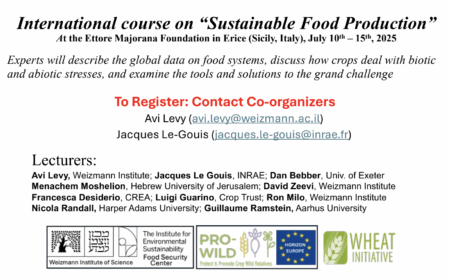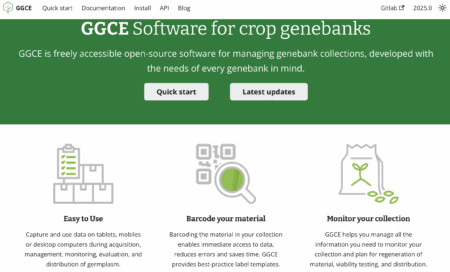
We are pleased to announce the international course on “Sustainable Food Production”. It will be hosted at the Ettore Majorana Foundation and Centre for Scientific Culture in Erice (Italy), July 10th – 15th, 2025, as part of the 5th International School of Materials for Sustainable Development and Energy. The Ettore Majorana Schools are prestigious and attract outstanding instructors and students from around the world. The setting is quite spectacular in the medieval hilltop town of Erice, Sicily.
Ph.D. students interested in food production and sustainable agriculture are eligible to apply. Experts in these topics will present a broad range of approaches to address the grand challenge of food security under climate change. We will describe the global data on food systems, discuss how crops deal with biotic and abiotic stresses, and examine the tools and solutions to the grand challenge. We will teach advances in the fields of agroecology, conservation, and utilization of crop wild relatives, as well as biotechnology approaches, including genomics, the use of whole genomes, gene editing, and AI in modern breeding. We will also present new food production systems and consider their environmental costs and scalability.
Applicants should include a One-page motivation letter stating their background, why they want to join the course, their long-term professional plans, a CV with a list of publications, and one recommendation letter. The deadline for applications is June 1st, 2025. Answers will be given by June 10th, 2025. Forty students will be chosen by three of the course lecturers. Please send applications to avi.levy at weizmann.ac.il.
Costs for students: € 900 for the whole period. The cost of € 900 is all-inclusive: accommodation in double rooms for students, meals (drinks excluded), two coffee breaks, social events (e.g., excursion), and pick up at Palermo or Trapani airports to Erice at whatever time they arrive. The same goes for departure. Flight to Palermo or Trapani airports is not included. A limited number of fellowships are available for students from Low-income countries.
Yours sincerely,
The Directors of the School
Prof. Avi Levy and Dr Jacques Le Gouis
Lecturers
Avi Levy, Weizmann Institute
Jacques Le Gouis, INRAE
Dan Bebber, Univ. of Exeter
Menachem Moshelion, Hebrew University of Jerusalem
David Zeevi, Weizmann Institute
Francesca Desiderio, CREA
Luigi Guarino, Crop Trust
Ron Milo, Weizmann Institute
Nicola Randall, Harper Adams University
Guillaume Ramstein, Aarhus University
Schedule Erice Course v3

